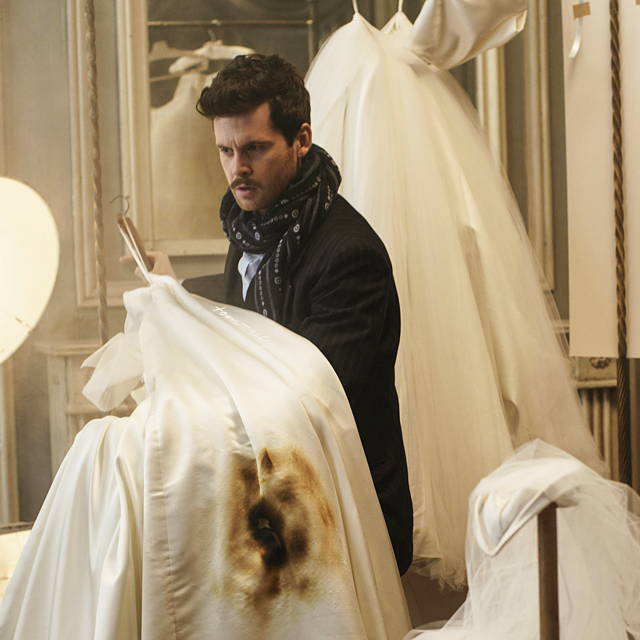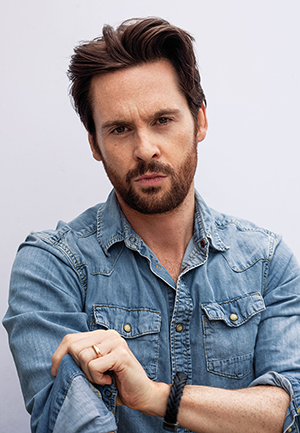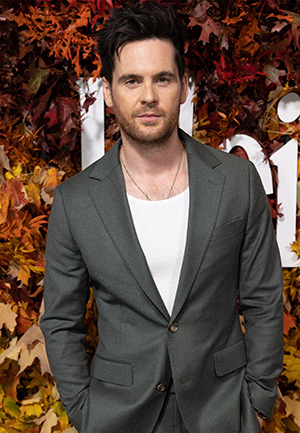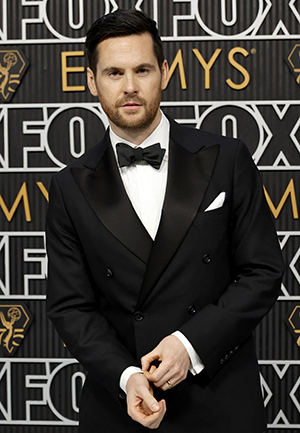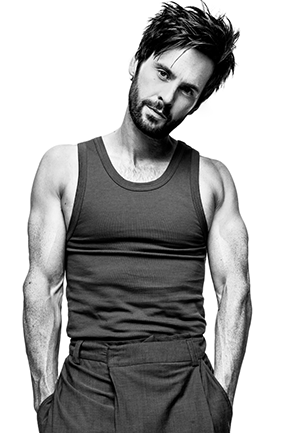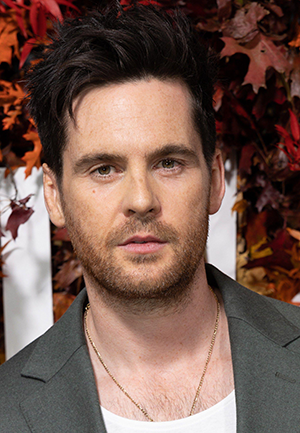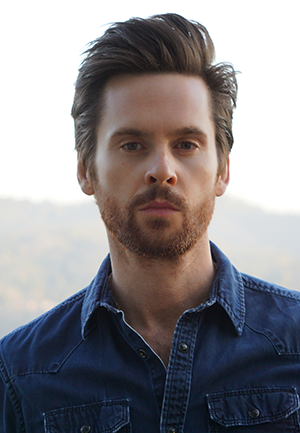It's our lucky day, after a long interview drought! There is another new interview with Tom for Collider, which has been shared online. Tom chats about The Collection, his character Claude, and why he was reluctant to get involved with another TV series after Da Vinci's Demons. Read it in full on Collider.
During this 1-on-1 phone interview with Collider, actor Tom Riley (Da Vinci’s Demons) talked about playing another (but very different) tortured genius, what drew him to The Collection, how beautiful this series looks, the new appreciation he has for the fashion world, the very complicated relationship between the Sabine brothers, whether he’d like to explore Claude’s life further, why Amazon is such a great company to work with, and whether he’s a binge-watcher himself.
Collider: How did you get involved with this series? After the end of Da Vinci’s Demons, had you considered not signing on for another TV series, or were you open to any medium, if the material was great?
TOM RILEY: I was very anti doing it, if I’m honest. It was very much that feeling of having worked so hard on Da Vinci’s for three years without seeing sunlight that, unless the right thing came along, I didn’t want to do it. The thing I did know was that I didn’t want to shoulder a show on my own, immediately. If something interesting and ensemble-y came along and the part was exciting, impactful and dynamic, then I wanted to consider it. And then, The Collection came along and I read it and thought the scripts were smart and dark and different. The character was different enough, and the ensemble that they were building was fascinating and interesting, and I wouldn’t have to shoulder it. So, I was out here and I met with Oliver Goldstick, the showrunner, who was busy on Pretty Little Liars, and he convinced me. He was very convincing!
What did he say that really convinced you and made you want to sign on?
RILEY: It was more the arc of the show. There were only a few scripts to go off, and in the beginning, Claude is in the shadows of the fashion house. He stays in the background, and he stayed in the background of the scripts. It was about where this character was going to go, how important he was going to be, alongside his brother, and how much it was going to be about fashion. It wasn’t necessarily going to be about fashion. It was going to be a family drama about a family falling to pieces under the weight of all of their lies. I was just like, “That sounds fascinating! I’m in!” This show seems so visual and so visceral.
How much of this did you get out of it when you read it? that apparent in the script?
RILEY: Very much so. Oliver is a very dynamic and imaginative writer, so the stage directions were visceral and very clearly written. On the page, sometimes they were even more fantastical than we were able to translate to the screen. It was even more crazy, out there and strange, on the page. And when it comes to describing how beautiful the dresses are or how unpleasant the murder is that opens the episode, it was definitely all there. The visuals were very music within the script, for us to pull out and make work.
It took people a little while to catch on to the kind of programming that Amazon offers, but they’ve had some real success now with their TV series. When did you realize that doing a streaming series was a viable option?
RILEY: I just think streaming feels like it’s the future. It allows people to watch things in a way that fits into their lives. Prior to this, the idea of sitting down and watching a show every week seemed like a great idea. The minute you’re offered another option, you’re like, “You mean, I can watch this every week, if I want to, or twice this week, if I need to, and not next week, if I don’t have time?” I didn’t even realize it was something we wanted or needed, which is where all great innovations come from. Also, the other great thing about it, that seems to be the case in streaming, is that a lot more scripts are written before you start. Because they are planning on allowing it all up at one time, you have four or five scripts to read and an outline of where it’s going to go. The writers aren’t chasing their tails as much. You’re able to see the beginning, middle and end of a storyline, and that is rare. Streaming allows that, in a way that network TV doesn’t.
When you watch TV, are you a binge-watcher, or do you prefer to savor episodes?
RILEY: I’d like to say that I’m a binge-watcher, but I don’t really have time. I think the most I’ve done in a sit-down is three episodes, maybe. It depends. The other great innovation are things like Transparent or Ten Mississippi on Amazon, Master of None on Netflix, and those half-hours. It’s a lot easier to watch a load of those because it’s far more palatable to go, “You know, I’m just going to do one more of these.” But if it’s something like The OA, you’re like, “Okay, I’ve watched an hour of that. I’ll leave another one until tomorrow.” When it’s a half-hour, it’s like a little bag of candy. You just keep going back until it’s gone.
People talk about the incredible freedom they get when they’re working with Amazon, and that the creator’s vision is really allowed to come through with little to no interference. How was the experience, for you?
RILEY: Because that’s what the people at the very top are getting, it filters down. They’re like, “We like the script and we like you. The money is there, so go make it.” The confidence instilled by Amazon, in people like Oliver [Goldstick] and Dearbhla Walsh, who’s our head director, just trickles down. Everyone feels like, “Okay, we can put our trust in someone. They’re not coming in, disheartened by a bunch of notes. They’re coming in, empowered by the fact that they can try to create their vision.” That makes for a happier set and, I think, better shows. If the shows don’t come out the way you expected, then at least they got a sense of authorship. There’s some sort of authorial presence behind it. At least, it’s a dignified failure.
What was it like to delve into the fashion world? What sort of insight and appreciation did you get, and how did that influence this project?
RILEY: I got far more insight than I’d ever had before. I didn’t know about the fashion world, or at least I took it for slightly superficial. I didn’t realize the extent of it. It’s an art installation to put out a collection, with the people behind the scenes who are inventing and creating these designs and making sure they’re realized on the catwalk, and just how much hangs on it for the designers. Their livelihoods hang in the balance, as far as whether this year’s collection works for them or not, and there are so many people’s jobs on the line, as a result of that. I just had no idea. I went to London Fashion Week for the first time, after I got the job, and it completely changed the way I perceived it. I thought, “This is a far bigger operation than I ever expected, and it has far more worth than I ever gave it before.” It definitely changed my view of the fashion world.
Because this is a character who does hang in the shadows a bit and we only get to learn bits of him at a time, did you have a moment where you felt like you really got who this guy was and you understood him, or was he always a bit of a mystery to you?
RILEY: It’s interesting because I always knew who he was and what was driving him. I feel like the beginning of Claude is the middle, and then as the arc goes onward, you see him change quite a huge amount. The baggage he has brought from his previous life is very present in him, from the top. He is abrasive, difficult and rude, and he’s not interested in being famous. That comes from a history of having to hide who he is, having to hide the truth about his sexuality, and having to feel like he was less than his brother. All these defense mechanisms have put him in the position where he wants to be in the background and he’s not interested. That’s what he believes. So, you go into this fully-formed, fucked up guy at the beginning, and then as the series progresses, he realizes that he doesn’t want to be in the background anymore. He’s won all of these accolades, so he wants all of the adulation. He starts to come out of the shadows and tries to get back into the light. That’s when I was like, “Okay, this is who he is. He’s just a little broken guy who wants to be noticed by his mum.”
Claude is a gay man who has secret affairs, drinks and lives a bit of a debauched lifestyle. If he could freely live the way he chose, what do you think his ideal life would look like?
RILEY: I think he believes he enjoys the debauched life and that the fun he is having is actually fun. It’s only when he sees that there is a chance for more than that, does he wonder if maybe that wasn’t as fun as he though it was. I think he believes the ideal life is being the front of his own fashion house, getting the label and everyone knowing how good he is, and getting to live the debauched life, but that simply doesn’t exist. He’s trapped. He’s trapped with his history and his position in the house, and he needs his brother far more than he ever believed he did. His brother is good at being the face of the whole thing, whereas he’s not good at that. In order for him to have the ideal life, he’d have to change who he is, 100%, or accept who he is.
It seems as though Claude and Paul really don’t see eye to eye on anything. What does Claude think of his brother, and how would you describe the relationship between them?
RILEY: He pretty much hates him, but also desperately and unconditionally loves him. It’s a very, very broken sibling relationship, where he doesn’t like who he stands for or who he becomes. He believes he’s a fake and a phoney, especially when, as the series progresses, you realize that they were potentially on practically opposing sides during the war. They really do not see eye to eye. They are the current state of this country. They’re split right down the middle and can’t possibly understand how the other one things and why, and yet they are drawn together. They are pulled towards each other and couldn’t live without each other. You do see moments, throughout the series, that are light and fun and show the friendship between them.
Do you think that, if he didn’t have this incredible ability and creativity for design that his brother ever would have bothered dealing with him?
RILEY: No, I think he’d be out on the streets. I think he’d be another guilty part of Yvette and Paul’s combined past. They might fund him, give him a little flat and tuck him away, but I don’t think they’d take quite as good care of him, and he probably wouldn’t let them either.
There are so many complicated layers to the relationship between these brothers. What was it like to work with Richard Coyle on this, and to explore that dynamic with him?
RILEY: It was great! Richard really went deep into what it meant to be a fashion designer and the face or a house like that. For me, it was easier because I got to just be the character who doesn’t give a shit. The spontaneity and slight unpredictability of Claude, and the way I was trying to play Claude, put Richard in a position that was more straight-laced. On set, there was a certain amount of tension, which really helped. Off set, we just hung out and pretended that wasn’t going on, on set. He’s a really good guy, and he’s so good in it.
You’ve been doing a variety of really interesting, really varied roles. What is it that you look for, in a project? Does it start with the script for you, or do you also want to know who you’ll be working with?
RILEY: The ideal situation for any actor on set is driven by enjoying playing the part. That’s the thing that matters to me. I hate the feeling of showing up on set and you don’t love the part or you don’t love the piece, and then it just feels like you’re just getting through the day. I’ve been there, and that’s not why anyone comes into the industry. I think you need to check yourself, the minute you’re feeling like that. For me, it’s absolutely about either working with someone you admire and respect, or working with friends. I think it’s really important, if a friend says to you, “Will you come along and do this? Will you do a couple of scenes in this indie? Will you help me out with this?” I always think that’s a really important, good thing to do ‘cause we’re all just trying to make it. But the part is everything, especially when you’re signing on for a series. You have to think, “Can I play this person for seven years and not get bored out of my mind or feel like I’m going stir crazy?” It’s different with a movie. I can pretty much play anyone for eight weeks. Seven years is a different deal.
Is this a character that you hope to get to explore and live in for awhile longer?
RILEY: Yeah, for a little bit, for sure. When you see the way the season ends, there’s a lot of places for him to go.
